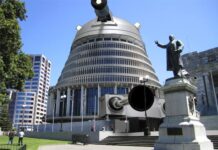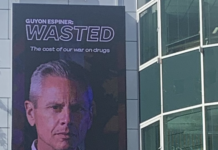 Announce protest actions, general chit chat or give your opinion on issues we haven’t covered for the day.
Announce protest actions, general chit chat or give your opinion on issues we haven’t covered for the day.
The Editor doesn’t moderate this blog, 3 volunteers do, they are very lenient to provide you a free speech space but if it’s just deranged abuse or putting words in bloggers mouths to have a pointless argument, we don’t bother publishing.
EDITORS NOTE: – By the way, here’s a list of shit that will get your comment dumped. Sexist language, homophobic language, racist language, anti-muslim hate, transphobic language, Chemtrails, 9/11 truthers, Qanon lunacy, climate deniers, anti-fluoride fanatics, anti-vaxxer lunatics, 5G conspiracy theories, the virus is a bioweapon, some weird bullshit about the UN taking over the world and ANYONE that links to fucking infowar.





ITs a FIRESALE! FIRESALE! FIRESALE! FIRESALE! FIRESALE! FIRESALE! FIRESALE! FIRESALE!
3Waters+2Waters is a $485B+ “FIRESALE!”
It’s a $485b+(est. cost to fix it) firesale of water services with 35 year contracts. Everything else being said is misdirection, suckers!
Whoever controls the infrastructure controls the $$!
Here is the architect, designer of the legislation for all of this.
Paul Beverley, of Buddle Findlay, specialises in the RMA, co-governance design in Treaty settlement processes, and advising local authorities on Treaty and Māori law issues. According to the Buddle Findlay website, he has extensive experience collaborating and negotiating with Māori and advising on Māori law issues. His particular specialty is designing and negotiating co-governance, co-management and relationship frameworks between the Crown, local government and Māori.
Anne Gibson, Property Editor of the New Zealand Herald, in an article on Beverley published 13 May 2017, “….in the past few years, the refrain sounding loudest in his life is redress for tangata whenua. That means addressing the wrongs of the past, helping Maori groups negotiate, then draft Treaty of Waitangi deeds of settlement as one of the Crown team representing the Justice Ministry’s Office of Treaty Settlements”.
Further insight into the views of Beverley can be found in his involvement as a participant in the Constitutional and Legal experts’ hui held by the government to discuss Crown-Maori Relations (20 March 2018). Notes produced by the participants include the following points:
There is a need to move beyond a consultation mind set to real partnership and engagement.
The Treaty is clear that there are two peoples in a partnership, with roles and responsibilities.
A concrete agenda/work programme should include the following: constitutional position of the Treaty; local government status; capacity and capability building – central and local government; institutional/systemic discrimination; water; shared outcomes; putting partnership into practice (e.g., the Department of Conservation has some useful approaches – local level solutions in particular).
Māori representation on local authorities – if moving towards Māori wards then other changes also need to be put in place to support them and for substantive long-term change and community understanding. They will fail to make effective change on their own.
A clear conceptual framework over the top is required, that defines local government in NZ and its roles and responsibilities in the Treaty/Māori space.
The Government needs a plan to educate communities, including exemplars of how people are positively relating, how the Crown and Māori are relating, the benefits for communities and the nation, and that it is not racist for the government to prioritise results for Māori.
Proprietary rights need to be defined with reference to two systems of law. There is a need to understand tikanga as law, rights and constitutionally.
Undertake a stocktake by running a Treaty ruler over legislation, regulation and policies.
Decolonisation required to allow a Māori lens to become first nature for government.
And again, for clues as to what Beverley thinks, see his paper entitled ‘A stronger voice for Māori in natural resource governance and management’, which he presented to the NZ Planning Institute conference 2015 – ‘Back to the Future’.
Paul Beverley claims that Māori have a deep and innate relationship with natural resources, saying that significant advances are being made to enable the expression of this relationship. In his paper he focussed on one of these advances – the arrangements delivered through Treaty of Waitangi settlements, giving the following four examples of Treaty settlement arrangements:
the tūpuna maunga arrangements in the Tāmaki Collective settlement;
the Waikato River settlement;
the Tūhoe – Te Urewera settlement; and
the Whanganui River settlement.
Paul Beverley acted for Auckland Council in the negotiations leading to the new Tupuna Maunga Authority. According to Beverley the Tāmaki Collective settlement reflects a significant reconnection between the Iwi of the Tāmaki Collective and their tūpuna maunga, which includes a detailed set of arrangements that provide a prominent voice for those Iwi in the future governance and management of, and planning for, those tūpuna maunga. Beverley was quoted in the NZ Herald 13 May 2017, saying:
“Those maunga are the embodiment of the iwi ancestors so the law now recognises that through the vesting of those volcanic cones back in the iwi, and the Tupuna Maunga (co-governance) Authority. It’s a really important point in the journey.”
Paul Beverley acted for the Crown on the Waikato River claim, which resulted in the Waikato-Tainui Raupatu Claims (Waikato River) Settlement Act 2010 and other legislation, recognising the river as a tupuna or ancestor with mana, and in turn representing the mauri or life force of the tribe. The Waikato River arrangements provide for the establishment of the Waikato River Authority, a co-governance authority comprising five members appointed by the river iwi and five members appointed by the Crown/local authorities. The Waikato River Authority is responsible for the vision and strategy for the Waikato River. The Vision and Strategy is a planning document with very powerful effect, in fact it is incorporated directly into the Waikato regional policy statement, and it overrides an RMA national policy statement in the event of conflict. Decision-makers under a wide range of legislation are required to consider and give legal effect to the vision and strategy.
Beverley is also active in spreading the co-governance net wider.
He is one of the three authors of the Hauraki Gulf Forum Governance Review and Recommendations, presented to the HGF June 2016, which recommended the 50/50 co-governance model, with greater powers.
He was also, from 2015, the ‘Independent’ Chair of the Sea Change Tai Timu Tai Pari (Hauraki Gulf Marine Spatial Plan) stakeholder working group. The Sea Change Plan also strongly pushes the ‘co-governance with iwi’ arrangement.
So go and knock yourselves out.
The question is, what are we going to do about it?
https://www.threenow.co.nz/shows/inside-child-poverty-revisited/inside-child-poverty-revisited/S4201-819/M65278-269
I am interested in why women are being given leadership positions around the world. Why should men step down just because women say it is our turn and we are smart and can do whatever. I never trust the powerful behind the scenes not to be opaque.
Now the Finnish woman Prime Minister is coming here speaking for Ukraine win. Meeting up with Jacinda PM to get a world hearing of the two.
https://www.rnz.co.nz/news/national/479776/jacinda-ardern-and-finland-pm-sanna-marin-hold-media-briefing
While thinking about the war this guy is another thoughtful voice, Anders Puck Nielseen.
https://cdissz.wp.mil.pl/u/Puck_Nielsen_Anders.pdf
https://www.rnz.co.nz/news/business/479810/means-testing-nz-super-payments-one-way-to-address-scheme-s-rising-cost
Means testing would likely end up being ‘mean’ testing. I remember some decades ago there was a meeting of oldies in the Auckland Town Hall I think, the old building. The old men got so stirred up at the ideas put forward that they drummed their feet on the floor. I wonder if that was caught on vied somewhere. That was about reductions in the super based around increases in personal income from work etc. and of course should include returns on capital.
I think that the total package of what is available to oldies should be set down clearly so it gets acknowledged, and this includes free health care and also there should be free housing that is specifically grouped for those of mature age, say over 60, where they can live in peace. There might be cottages for suitable disabled mature people also.
Those who work or receive investment income, should lose part of their super on a sliding scale, not $ for $ though. The government carries out a rort on extra moneys for other beneficiaries where for every $ earned they reduce the benefit by $1, but the earned $s then have tax taken from them so sly gummint takes the opportunity to trim down more. With superannuation there should a;ways be a minimum payable and useful medical care available free, for normal availability, ie not talking about whimsical stuff, also help with funeral costs and grants to hospices.
And this would be a good time to confer with those supporting euthanasia as to how it could be carried out legally in appropriate manner, not entirely free but with a small charge to the person concerned, and those with special circumstances could apply for a grant, not a loan.
It would be a wise move, and fair, and all the concerns of those set against it could be dealt with, and then they could shut up and let people choose their own time of departure, carried out appropriately to family, friends and with estate matters settled fairly.
https://www.rnz.co.nz/news/business/479787/reserve-bank-seeks-public-feedback-as-part-of-monetary-policy-review
…The Reserve Bank will be hosting zoom and in person workshops in Wellington next week about the discussion documents and other materials, which can be found on the RBNZ website.
The public have until 27 January to make a submission.
…Another item open for consideration was the balance between the central bank’s dual mandate of meeting price stability and maximum sustainable employment.
Warning, nostalgia coming up. I used to have a lovely little wallet -shaped money box made in brass I think with teeth at one end to receive coins and a key for when it was full, it was covered in red leather with I think the NZ coat of arms in gold printed on, the side and issued from the Post Office. Do any oldies remember these?
We took our money seriously then, ‘Look after the pennies and the pounds look after themselves’ was the idea. Now we know that if we save too much the everyday economy will collapse, being consumers keeps money going around and there is the appearance of a thriving economy. Only so much of the supply of consumer goods comes from overseas, Not Made Proudly in NZ, because we are too dear with low productivity so need to drop the wages till we live on bread and have to pay for our water.
Now that petrol stations are calling for fog horns private businesses putting their hands out what about the puncture, I got yesterday in my brand-new Tyre costing me $45 to fix cause many of our roads are fill of potholes who do I send the bill to.